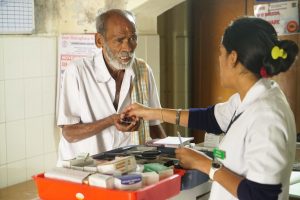
04-01-2019 (Important News Clippings)
To Download Click Here.
समाज सुधार से टकराती राजनीति
नीरजा चौधरी, वरिष्ठ राजनीतिक विश्लेषक

नए साल की इससे अच्छी शुरुआत नहीं हो सकती थी। सुप्रीम कोर्ट के आदेश के बावजूद बीते तीन महीनों में 10 से 50 वर्ष की महिलाएं केरल के सबरीमाला मंदिर में प्रवेश नहीं कर पाई थीं। जिन महिलाओं ने मंदिर में घुसने की कोशिशें कीं, उन्हें जबरन रोक दिया गया था। मगर बुधवार को अहले सुबह इस उम्र की दो महिला श्रद्धालु भगवान अयप्पा की पूजा करने में सफल रहीं और सैकड़ों वर्ष पुरानी उस परंपरा को तोड़ दिया, जिसे नारी-विरोधी कहना ज्यादा उचित होगा।इस सुबह का इंतजार लंबे अरसे से था। हालांकि इसे विडंबना ही कहेंगे कि अयप्पा मंदिर में हर उम्र की महिलाओं के प्रवेश का विरोध खुद महिलाएं भी कर रही थीं। वे आज भी अपने तर्कों पर अड़ी हैं।
उनका मानना है कि चूंकि भगवान अयप्पा ब्रह्मचारी हैं, इसलिए रजस्वला औरतों का उनके सामने जाना गलत है। बुधवार की ‘घटना’ से उनकी आस्था को चोट पहुंची है। पर क्या उनके इस विरोध से धार्मिक स्वतंत्रता के उस अधिकार का हनन नहीं हो रहा, जो हमारे संविधान ने देश के नागरिकों को दिया है? सवाल यह भी कि शीर्ष अदालत के आदेश को न मानकर उसकी अवमानना का हक इन महिलाओं को भला किसने दिया? असल में, यह हमारे देश की नियति है कि जब कभी रूढ़ीवादी परंपराओं को बदलने की कोशिशें हुईं, विरोध के तेज स्वर उभरे। सती प्रथा के अंत के समय भी लोगों ने बदलाव का मुखर विरोध किया था। परंपरा की दुहाई देकर यदि हम सकारात्मक कामों का विरोध करेंगे, तो फिर समाज में किसी तरह का कोई सुधार नहीं आ सकता।
यह पूरा मसला अब सिर्फ सबरीमाला मंदिर में प्रवेश का नहीं रह गया है, बल्कि यह अब एक राजनीतिक लड़ाई की शक्ल ले चुका है। जब सुप्रीम कोर्ट ने सबरीमाला मंदिर के दरवाजे हर उम्र की औरतों के लिए खोले थे, तब विरोध-प्रदर्शनों में भाजपा और कांग्रेस, दोनों पार्टियां अपनी राजनीतिक रोटियां सेंक रही थीं। मगर मंगलवार को जब 30 लाख से अधिक महिलाओं ने 602 किलोमीटर लंबी मानव शृंखला बनाई, तो उसे भारत की कम्युनिस्ट पार्टी-माक्र्सवादी (माकपा) ने पूरा समर्थन दिया। 2019 चुनावी वर्ष है, इसीलिए आने वाले दिनों में केरल सियासी जंग का एक बड़ा अखाड़ा बनने जा रहा है। इस मुद्दे को लेकर पक्ष और विपक्ष, दोनों तरफ से जमकर आरोप-प्रत्यारोप होंगे। एक-दूसरे को निशाना बनाने का कोई मौका शायद ही गंवाया जाएगा।
इस पूरे विवाद का एक सामाजिक पक्ष भी है। यह घटनाक्रम बताता है कि कितनी तेजी से बदलाव हो रहे हैं। महिलाओं की उम्मीदें लगातार परवान चढ़ रही हैं। ‘टीनएज गल्र्स रिपोर्ट’ भी इसकी तस्दीक करती है, जिसे नन्ही कली नामक एनजीओ ने 75,000 लड़कियों से बात करके तैयार की है। इस रिपोर्ट में देश के तमाम राज्यों की लड़कियों से उनकी अपेक्षा जानने का प्रयास किया गया है। इसमें से ज्यादातर लड़कियों का जवाब था कि वे 21 साल से पहले शादी नहीं करना चाहतीं। वे पढ़ाई पूरी करके नौकरी करना चाहती हैं। अंग्रेजी और कंप्यूटर भी वे सीखना चाहती हैं। यानी अपने हित में लड़कियों की उम्मीदें एक अलग मुकाम पर हैं। मगर दुर्भाग्य से राजनीतिक दल इसे देख नहीं पा रहे। अब तक यह भी नहीं सोचा गया है कि सामाजिक बदलाव लाने में आधी आबादी का किस कदर इस्तेमाल किया जा सकता है? जबकि महिलाएं यदि एकजुट हो जाएं, तो सत्ता का खेल पूरी तरह बदल सकती हैं। कुछ वर्ष पूर्व आंध्र प्रदेश और हरियाणा में हमने देखा ही है कि नशाखोरी के विरुद्ध औरतों की एकजुटता ने किस तरह सरकार बनाने में मदद की। हाल के छत्तीसगढ़ विधानसभा चुनाव में भी कांग्रेस की जीत की एक बड़ी वजह वहां की महिलाओं का शराब और नशा का मुखर विरोध करना था।
गौर कीजिए, आने वाले दिनों में महिलाएं अपने हित में कहीं ज्यादा मुखर होंगी, इसीलिए मैं यह सदी महिलाओं, खासकर नई उम्र की औरतों की मानती हूं। अब जब 10 से 50 आयु-वर्ग की दो महिलाएं अयप्पा मंदिर में प्रवेश कर चुकी हैं, तो जरूरी यह है कि यह घटना सांकेतिक बनकर न रह जाए। ऐसा नहीं होना चाहिए कि आज के बाद फिर महिलाओं को तमाम सुरक्षा के साथ मंदिर की ओर बढ़ना पड़े; उन्हें यह डर सताता रहे कि उनके साथ अभद्रता की जा सकती है या फिर उन पर हमला बोला सकता है। फिलहाल मंदिर में महिलाओं की अबाध आवाजाही मुश्किल लग रही है। बुधवार को ही उन दोनों महिलाओं के लौटने के बाद मंदिर को ‘शुद्ध’ किया गया। जब तक समाज के रवैये में बदलाव नहीं आएगा, तब तक हर उम्र की महिलाएं बेरोक-टोक भगवान अयप्पा के दर पर शायद ही जा पाएंगी। सच यह भी है कि सबरीमाला विवाद इतनी तेजी से नहीं भड़कता, यदि इसमें राजनीति शामिल नहीं होती। बेशक आस्था की एक अदृश्य बेड़ी होती है, लेकिन हमारे सियासी दलों ने इस जंजीर को मजबूत बना दिया है। विवाद का आज जैसा रूप कतई नहीं होता, यदि सियासी फायदे को देखते हुए महिलाओं को सामने रखकर अदालती आदेश का विरोध नहीं किया जाता।
सबरीमाला विवाद का सबक यही है कि हमें इस तरह के राजनीतिक टकराव से बचना चाहिए, क्योंकि इससे सामाजिक सुधार की असली कोशिशें बेअसर हो जाती हैं। यह अब केरल की संजीदा जनता को तय करना है कि वह यहां से किधर बढ़ना चाहती है? वहां जाहिर तौर पर आने वाले दिनों में ‘काउंटर मोबलाइजेशन’ का प्रयास होगा। भगवान अयप्पा को ‘शुद्ध रखने’ के तमाम तिकड़म किए जाएंगे। सियासी दलों की तरफ से तीखी प्रतिक्रियाएं आएंगी। पर क्या इन सबसे आम अवाम को कुछ फायदा होगा? अदालती आदेश का विरोध करने वालों को यही समझना है। समझना यह भी है कि ईश्वर कभी अशुद्ध नहीं होते। यह तो हम इंसानों की फितरत है।
Beyond temporary relief
Challenge for Ayushman Bharat will be to spur systemic change in healthcare.
Sanjay Nagral, (The writer, a Mumbai-based surgeon, is the chairperson of the Indian Forum For Medical Ethics.)

Bharat Solanki, who turned 20 this year, lives in a slum along the eastern side of the rail tracks in Mumbai’s suburb of Bandra. He crosses everyday to the west of Bandra to work as an apprentice mechanic in a garage. Last year, around the time Mumbai was in the grip of the Ganesh festival, Bharat started experiencing abdominal pain and weight loss. When several courses of tablets from obliging chemists did not help, he visited a local doctor. The doctor gave painkiller injections, which would reduce the pain temporarily. Later, when I got a chance to study his case papers, it was apparent that over two months Bharat had visited several doctors. This included multiple private clinics and also the public hospital in Bandra where I head the surgery department.
He had been treated with symptomatic medicines and his pleas about the lack of response were ignored. One night in October, Bharat woke up with excruciating pain and vomiting. His family rushed him to a nearby private hospital where after an X ray, they were informed that his intestine had ruptured and he would need urgent life saving surgery. And that the treatment could cost up to Rs 5 lakh and that they would not operate unless a deposit of a lakh of rupees was paid. The family ran around pleading for help. They requested the hospital to give them time to get the money but this was turned down. Eventually, Bharat was brought to our hospitals’ casualty. He was operated within a few hours. His belly was full of foul intestinal contents and there were two holes in his intestine. The abdomen was riddled with small white nodules suggesting tuberculosis. My colleagues tried to salvage the situation. However, just as we thought that the worst was over, we noticed bowel contents seeping out of his surgical wound. One of the devastating effects of TB and malnutrition is on the body’s ability to heal — one of the stitched holes in the bowel had opened out.
Bharat needed multi-pronged care for what was now an intestinal fistula. This is a complication that puts huge demands on resources, which include very costly intravenous nutrition support. In India, this often means death for the poor. Fortunately, Bharat had some things on his side — his youth, a treatable disease and committed family members. He also qualified for the Mahatma Jyotiba Phule Jan Arogya Yojana (previously the Rajiv Gandhi Jeevandayee Arogya Yojana), Maharashtra’s state-sponsored health insurance scheme. This enabled us to procure a specialised apparatus, which sucked out intestinal contents from the wound, costly antibiotics, intravenous TB drugs and nutrition solutions. Three months later, the hole slowly shrunk and finally closed. After three long months in hospital, Bharat was discharged.
Over the last five years, our department has treated a large number of patients with complex surgical problems. My colleagues would tell you that the scheme benefits many of these patients. Prime Minister Narendra Modi’s Ayushman Bharat National Health Protection scheme is a grander pan national version of the scheme that helped Bharat.
Healthcare in India has traditionally relied on “schemes”, which have short-term purchase and enormous emotive impact. However, Ayushman Bharat has shifted the discourse from less emotive but vital areas like budget, infrastructure and system change to the simpler terrain of relief and philanthropy. Like in mass disasters, it’s easier to offer interim relief rather than fixing complex systems. The tertiary care component of Ayushman Bharat is essentially an act of interim relief for major illnesses.
Last week, when I reviewed Bharat, he was looking forward to resuming his work. The kind of questions that troubled me were not on his mind. Why did his neighbourhood doctor give him pain injections when he had TB brewing inside his belly? Why was the diagnosis delayed by months? Why did the private hospital demand such a large sum of money in an emergency? Why is it that a public hospital, which in any case is duty-bound to provide care for all citizens, needs a “scheme” to help procure essential drugs? And what happens to the many poor who don’t qualify under the scheme for lack of appropriate papers? For individuals like Bharat who have been at the receiving end of a healthcare system, the bar of expectation has been set so low that what the system had done for him during the hospitalisation could have only evoked thankfulness.
As we move into a new year, I have contradictory feelings about what Ayushman Bharat’s potential. There is the hope that it will help rescue many of those who are currently caught in the tragic pincer of an inadequate public system and an unaffordable private system. But there is also the apprehension about what the scheme will do to long-term policy. If it reaps electoral benefit, it could strengthen the narrow “scheme”-centred narrative that has distracted from fundamental change. Or it could lead to a quantum jump in people’s expectations from the state and raise the bar on competitive politics. As a response to Ayushman Bharat, Rahul Gandhi was recently quoted as saying that he would implement a scheme like Britain’s National Health Scheme if voted to power. Strange as it sounds coming from a party that allowed a free run for the market in health care under its watch, it’s a leap of imagination. If Ayushman Bharat can feed into solid ideas like publicly-funded universal healthcare we may then be onto something transformative.
